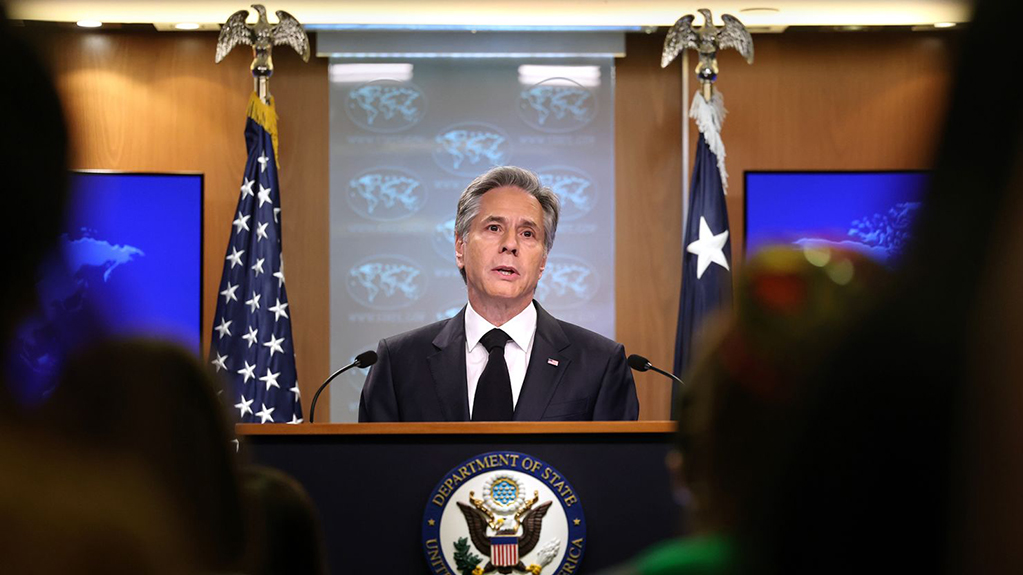The US State Department published the 2023 report on human rights in Georgia. The chapter on freedom of expression discusses the Russian law and cites instances of violence and threats of violence against journalists, including those by government officials.
News
The State Department notes that Georgia's constitution and laws protect freedom of expression, including for the press and other mass media. However, journalists, non-governmental organizations, and the international community have expressed serious concerns about the government's respect for this freedom. Concerns relate to the imprisonment of the head of the opposition media, the deteriorating environment of media pluralism, and the draft law, which considers media organizations receiving funding from abroad as "foreign agents." Additionally, there are concerns about violence and threats of violence against journalists.
“The government allegedly illegally surveilled journalists. The PDO reported that nobody was charged over an allegation of surveillance of journalists of the Mtavari television station. NGOs reported that previous investigations of illegal surveillance of journalists remained pending.”
The report notes that the new press accreditation rule introduced by the Parliament Speaker in February 2023, which media organizations called noninclusive and vague, imposed additional restrictions on journalists. In several cases, the Chief of Staff of the Parliament suspended their accreditation. The State Department notes that the Charter of Journalistic Ethics of Georgia and the Public Defender considered it problematic that only critical media outlets were sanctioned under the new rule.
“The GCJE cited access to information as a major problem for journalists and listed numerous examples when state institutions failed to provide media with information and prevented their coverage of public events. The Media Advocacy Coalition expressed concern over the denial of entry to several journalists who sought to attend open parliamentary hearings.
There were instances in which the government restricted public figures, political opponents, and journalists from criticizing the government or discussing matters of public interest. For example, Nika Gvaramia, founder and former general director of the largest opposition-leaning television station Mtavari Arkhi, was incarcerated from May 2022 until he was pardoned by the president on June 22. He had been convicted on charges of abuse of power. Amnesty International and local NGOs asserted his conviction raised concerns for media freedom. The PDO assessed the case was politically motivated and violated Article 18 of the European Convention on Human Rights. An appeals court and the Supreme Court, however, upheld Gvaramia’s conviction in November 2022 and June 19 respectively.
Media watchdogs expressed concern that the legal battles between the Ministry of Defense and Formula TV founder and former Defense Minister Davit Kezerashvili were aimed at eliminating the critical television station,” the report says.
The State Department notes that over the past year, there have been reports of violent physical attacks, threats of violence, harassment, and defamation complaints against journalists. The report includes the attack on Misha Mshvildadze, the owner and host of the Formula television company, as well as violence against journalists during the March protests. The State Department notes that "There was also a lack of accountability in such cases”.
“During the March protests against the “foreign agent” legislation, dozens of journalists and camera operators were subjected to tear gas as well as physical and verbal abuse from police. Others were arrested while trying to report on the protests. The GCJE criticized subsequent court proceedings against the journalists, including for lacking due process, as well as marathon hearings that lasted until early morning hours.
Journalists were also subjected to threats of violence. According to the Media Advocacy Coalition, after Gela Mtivlishvili, a reporter from online media site Mtis Amebebi, was subjected to verbal criticism by ruling-party figures August 3 for his reporting on the Shovi landslide, local officials threatened to “throw him in the water,” and he received death threats.
Journalists were often subjected to defamation lawsuits. According to the Georgian Democracy Institute (GDI), there was a growing tendency for government representatives or persons associated with the government to initiate defamation lawsuits against media outlets critical of the government. The report noted 38 such cases for 2021-2023, which GDI considered to be aimed at discrediting critical media outlets and discouraging them from expressing critical opinions. Transparency International/Georgia reported these cases were often decided very quickly and imposed high fines on outlets.
Government officials were not held accountable for violence and harassment. Media organizations expressed concern regarding the judgment of the Appeals Court of Tbilisi lowering the sentences of those responsible for the July 2021 Pride-related violence. No organizers of those attacks were charged,” the report says.
The State Department reports numerous incidents of journalists being attacked by far-right groups in the past year. For example, Mamuka Andghuladze, a member of Alt-Info, attacked Nato Gogelia, a journalist from the TV Pirveli station.
“Gegelia subsequently received threats and her house was burglarized. The Media Advocacy Coalition appealed to state authorities to provide security measures for the journalist. The Special Investigation Service arrested one person for the incident.
In another example, on May 20, security guards at a Kvareli Lake resort physically attacked Formula TV journalists covering protests over the rumour that Russian Foreign Minister Sergei Lavrov’s daughter was attending a party at the property,” State Department notes.
The report criticized a law passed in October that expanded the mandate of Georgia's National Communications Commission to investigate and fine media organizations for using obscenity or hate speech. Before the adoption of this law, the regulation of obscenity and hate speech was the responsibility of a self-regulatory body. The State Department notes that the Media Advocacy Coalition has criticized the state's increased role in media oversight.















